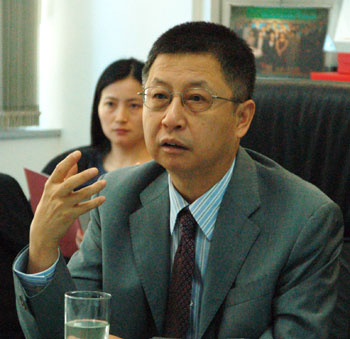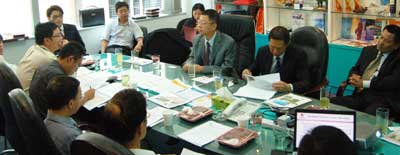 Despite its lumpy earnings, executive chairman, Mr Wong Lam Ping, explains Pan Hong is a conservative company with stable growth. Photo by Sim Kih
Despite its lumpy earnings, executive chairman, Mr Wong Lam Ping, explains Pan Hong is a conservative company with stable growth. Photo by Sim Kih
REAL ESTATE transaction prices for Pan Hong’s projects have exceeded expectations despite recent property price curbs, according to its executive chairman Wong Lam Ping during its 1Q2011 results briefing.
Pan Hong’s top line for 1Q2011 more than tripled year-on-year to Rmb 88.2 million (up 269.9%), as revenue was recognized for a higher number of residential units handed over to buyers.
Most of these are from two projects: Hangzhou Liyang Yuan and phase 2 of the Nanchang Honggu Kaixuan.
Gross profit margin was 10.2 percentage points higher at 36.2% in 1Q2011, compared to 26.0% in 1Q2010 when revenue was booked for the sale of car park lots at phase 1 of the Nanchang Honggu Kaixuan project.
Net earnings were Rmb 13.0 million, up 27.4%.
Pan Hong has a market cap of only S$252 million but Mr Wong pointed out that it is most conservative among property developers in China.
Its cash reserves were Rmb 299.3 million, and gearing only 12%, as the company did not take on large projects that required excessive borrowing.
During 1Q2011, Pan Hong sold another 41 of 222 units at Hangzhou Liyang Yuan and 45 of 844 units at phase 2 of Nanchang Honggu Kaixuan.
With an aggregate pre-sales value of Rmb 702.0 million for its residential and commercial units as at 30 June 2010, the group remains positive in its outlook for the coming quarters.
|
|||||||||||||||||||
In addition to the sale of the remaining residential units of Nanchang Honggu Kaixuan Phase 2 and Huzhou Hua Cui Ting Yuan Phase 1, property developer will focus on the sale of its maiden commercial units (in Nanchang Honggu Kaixuan Phase 1 and 2 and Huzhou Liyang Jingyuan Phase 2).
”Speculative demand is shifting from residences to commercial units,” said Mr Wong.
Mr Wong also expressed confidence that visibility in China’s property sector is becoming clearer.
He was referring to China’s allocation of over Rmb 60 billion during the first 6 months of 2010 to construct about 5.8 million apartments to provide public housing for mid to low-income families at subsidized rental rates.
The veteran property developer explained that home transaction volumes are adversely impacted by curbs on property speculation, enforced as a result of public outcry against the skyrocketing home prices.
Now that the severe housing shortage is addressed, Mr Wong foresees that the spate of property market curbs will taper off.
 Briefing for Pan Hong's 1Q2011 results announced on 29 Jul. Photo by Sim Kih
Briefing for Pan Hong's 1Q2011 results announced on 29 Jul. Photo by Sim Kih
Below is a summary of the questions raised at the results briefing and the management’s replies:
Q: How do you recognize revenue?
Our property units are sold before construction is completed.
Revenue is recognized as a lump sum for each unit that is issued an occupation permit by the relevant government authorities, when the completed units are handed over to the buyer.
As a result, our earnings will appear lumpy.
Q: Is it a good time to buy land now?
We believe so. We are accumulating land bank now.
Q: What caused the dramatic increase in tax rate (from 6.9% 1Q2010 to 43.0% in 1Q2011)?
The increase in tax rate was due to our high gross profit margin. In China, we are taxed on appreciation of land value, in addition to corporate tax.
When the value of our land bank appreciates by 50% or less, we are taxed 30% of the capital gain.
When the value of our land bank appreciates by over 50%, we are taxed 40% of the capital gain.
Q: How did you incur the investment loss in A-shares?
The Group incurred a fair value loss on financial asset of Rmb 5.6 million in 1Q2011 compared to a fair value gain of Rmb 1.1 million in 1Q2010.
This is a paper loss, incurred as a result of a plunge in stock markets during Jun when we closed the books.
Related story: PAN HONG: Property curbs draw 'buy', 'neutral' calls from analysts







